Vera Tamari and I met in college, in 1964. After graduation, our paths took us separate ways, hers back to Palestine and mine to the US. We stayed in touch through infrequent meetings in Amman and Ramallah. Beyond our friendship, Vera Tamari’s work has always made me wonder: How does she create such powerful works in such delicate, almost enigmatic ways? My writing is occasioned by this question, in an amateur impulse, with the original sense of that word in mind.
Taline Voskeritchian
Rooted in the everyday life of Palestinians under occupation, Vera Tamari’s art looks out to a violated landscape, to her ancestral seaport of Jaffa, on the Mediterranean, to centuries of Islamic art, to the invasion of her native land by successive armies, and more. She uses clay, paper, fabric, metal, plexiglass, wood, paint, stone, film, wire screen and photographs to create a body of work which is as varied as it is defiant of political and aesthetic categorizations. It questions artistic boundaries and symbols and marries local traditions with larger movements and art practices.
Over a lifetime spanning the 1967 War, two Intifadas, and innumerable Israeli incursions into the West Bank and Gaza, Tamari has also been witness and chronicler, educator and engaged artist, observer and creative force. Since the mid-1960s, she has researched and documented the pottery and architecture traditions of Palestine; founded and directed two museums at Bir Zeit University (BZU), one physical and the other virtual; helped establish art associations and galleries and planned exhibitions; trained young Palestinian women to become art teachers at the UNRWA Women’s Training Center; and taught architecture and design students at BZU.
All this and more is documented in two recently published books: Intimate Reflections: the Art of Vera Tamari (A.M. Qattan, 2021) and Returning: Palestinian Family Memories in Clay Reliefs, Photographs and Text (Arab Image Foundation AIF and Educational Bookshop, 2022). The essays and commentary by fellow artists and art professionals in Intimate Reflections place Tamari’s achievements in their political, local, and familial contexts. They offer a view of the artist as an individual of many guises and roles: painter, ceramicist, installation artist, institution-builder, art teacher, curator, and community activist in a society under occupation.
In Returning, Tamari is the author of the book’s ten chapters, each dedicated to one specific terracotta bas-relief panel of her series Family Portraits (1989-1996). The book belongs to that august tradition of Palestinian family chronicles, and is inhabited by a remarkable gallery of individuals, their stories grounded in calamitous events of expulsion, deportation, and returns, but also more quotidian experiences of socializing, courting and, of course, sitting in front of the photographer’s camera. Tamari tells these stories in a style which is as light as it is sorrowful. Hers is the malleable voice of the writer who appears and disappears and appears again somewhere else, in some in-between place, weaving a sustained narrative, chronicling habits, describing the intimate culture of pre- and post-1948 Palestine.
In Intimate Reflections, the painter Samia Halaby points out that Tamari’s method is that of “gathering parts,” and has its sources in the “Arab art of geometric abstraction that flourished between the eleventh and eighteenth centuries,” the “liberation artists of Beirut during the 1970s,” and the “intifada artists of the 1980s,” plus Cubism and Mexican muralism. Halaby says that Tamari challenges the conventional ways of containing these assembled parts; her works, especially the bas-reliefs, question the delineations between the art object, everyday life, and experience. Conceived and given shape under conditions of a long, brutal military occupation, this gathering of parts is a generative metaphor for Tamari’s entire artistic project. The principle is evident in this portfolio too, which Tamari herself chose for this writing.
Clay is one of the most pervasive of Tamari’s materials, particularly in Family Portraits, Tale of a Tree (2002), Oracles from the Sea (1998), and Warriors Passed By Here (2019). Although Tamari uses glazed clay to produce studio ceramics, the color and texture of the material intimates that earthy, natural quality native to the region in shards and layers of history. In Tamari’s hands and upon her ceramicist’s wheel, glazed clay becomes a medium of possibility, of gathering. In Family Portraits, the photographic image migrates, as it were, to clay, and in the process acquires the heft and bulk of sculpture, which fixes the photographic moment and expands it in time and space; it gives the human figures a collectivity, even solidarity. But Tamari does something else: she adds a painterly background to each work and frames the panels with tile work. The result is unsettling but also memorable. Without facial expressions, the figures acquire the universality of form, but also the anonymity of the universal which is in turn complicated by framing it with the local craft of decorative tile.
In an interview in Intimate Reflections with Yazid Anani, Tamari says that, “representing Palestinian life or a Palestinian landscape [is] in itself a subversive activity.” The statement is a kind of dare to the viewer because her works both are and are not what they seem to be on the surface; the disruptive impulse is rarely explicit.
Take for instance Oracles from the Sea. Oracles are the harbinger of prophecy from the gods, but in Tamari’s installation they are more like a chorus of laments that cannot be voiced, that is crushed under the weight of sorrow for the “bride of the sea.” The oracles are speechless as it were, their faces contorted, their bodies mere metal spikes. Their eyes are small slits in the clay through which the Mediterranean sunset is rendered in rectangular panels. It’s as if the sunset itself were sliced; with the loss of its “bride of the sea,” the sunset itself is in danger of losing its light. On-site, there on the Mediterranean shore, with the sea behind them, these oracles acquire an other-worldly quality but also an immediacy, as though they were an invitation to the viewer, a face-to-face encounter. In an email, Tamari writes: “I once took some of the oracles to Jaffa and made an installation on the sea shore there, planting the rods into the sand. The wind that day made the rods move with the faces becoming breathtakingly animated, and the moving waves could be seen from the eyes and mouths openings adding further life to the heads.”
“Vera Tamari has quietly disrupted what is deemed sayable and doable in public art and scholarly discourse on Palestinian art,” writes Hanan Toukan in Intimate Reflections. In Tale of a Tree, Tamari’s attention is to the olive tree, symbol of Palestinian suffering, livelihood, and steadfastness but also of the Israeli policy of uprooting thousands of fruit-giving trees. It helps to know that, as Tamari says in the artist’s statement, Tale of a Tree came into being during the 2002 Israeli invasion of Ramallah. Confined to her home, Tamari began shaping clay into miniature olive trees as a ritual of internal resistance.
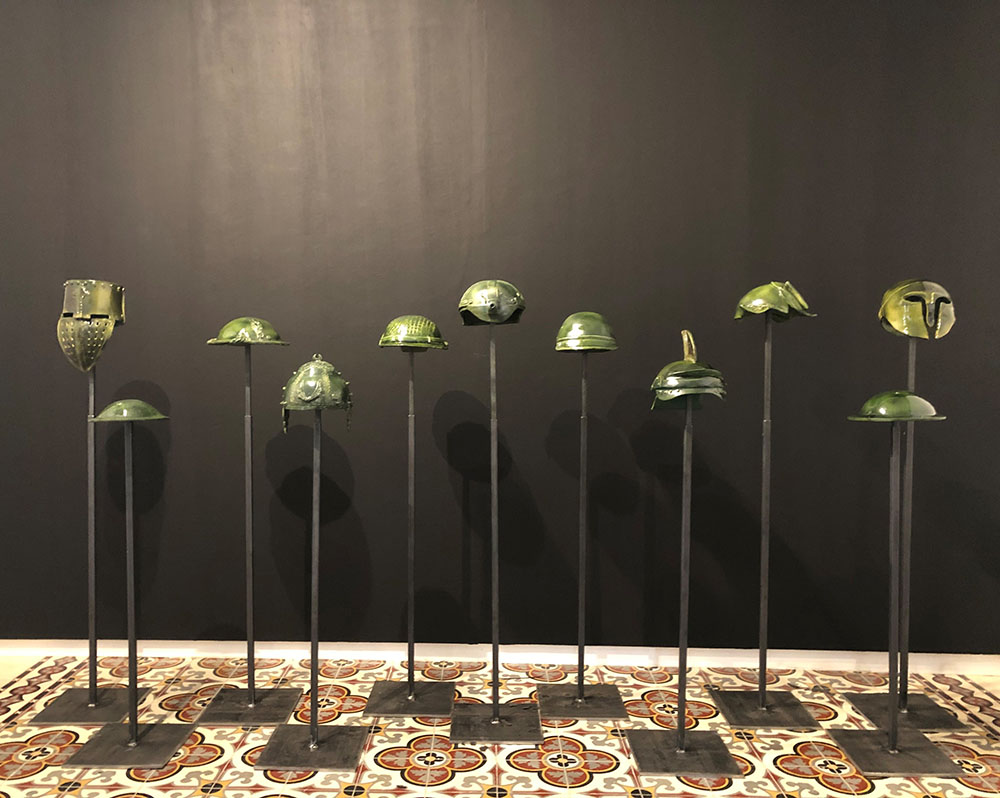
The clay trees are set against the background of a photograph of an actual olive tree with its abundant branches and portly bark. The contrast is striking: Beyond the black and white of the original photograph and the earth tones of the clay trees, Tamari’s installation points two ways: to the artist’s symbolic gesture of shaping and gathering tiny trees, and to the symbol itself now changed — made much smaller but also amplified to 660 trees and gathered into an entire forest on a plexiglass base. What is not spelled out but inhabits the realm of the unseen and unspoken is the artist’s kitchen work, the long, patient labor of bringing each olive tree to completion, assembling the trees, setting them up against the photograph — a fragile gesture against the violence of the invader.
In Warriors Passed By Here, the invaders — in the plural, spread out over the centuries, across Palestine — are their military helmets, from Greco-Roman, to Israeli. Tamari’s artist’s notes tell us that the installation is set against watercolor paintings of Palestine’s landscape. Here though, the absence of that background adds a chilling dimension, intensified by the documentary details of the helmets themselves. The linear gathering is significant in that the invaders, unlike the oracles from the sea or the family portraits, are, as the title says, elements in a long, historical process, or procession. The helmets of the invaders are the emblems of military power, but here they appear as what is left behind, as remnants — meticulously crafted remains of their wearers’ violence and destruction.
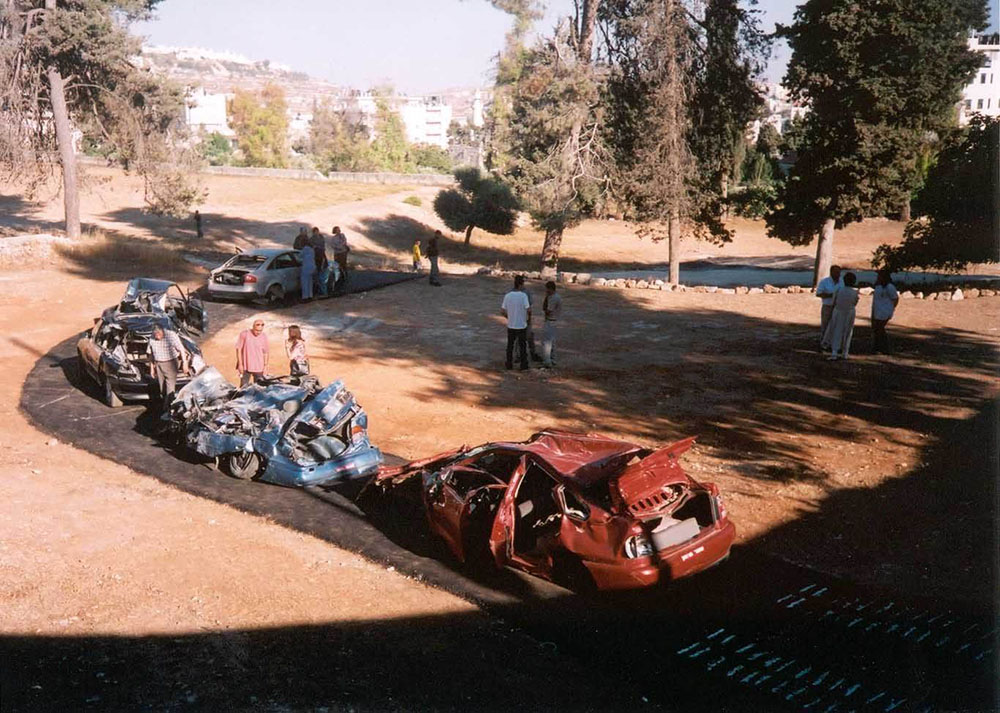
In the gathering of parts, Tamari’s impulse is to bring mutually exclusive opposites together, especially in the installation pieces, which by their very nature embody the paradox of art-under-occupation: They are meant as installations, to withstand the ravages of time and invasion, but they are also at the mercy of the invader’s violence. In Home (2016), Tamari transforms home into its opposite, and Going for a Ride? (2002) betrays more than its fun-loving title. Both are public art installations, one still standing and the other long destroyed by the invader’s army.
Home, a plexiglass stairwell caged by wire screen, sits in the Palestinian Museum Garden in Bir Zeit, at an elevation, surrounded by native vegetation. Tamari says that the stairwell recalls the stairwell of pre-1948 Jerusalem homes, which connect homes and families to each other. In this installation, the stairwell is isolated, dismembered from its native material, and caged and separated from its surroundings as a means of “security” against the settler encroachments, which are never far away. Unlike those of traditional Palestinian homes, all of Home’s materials are synthetic. More tellingly, Home is devoid of human beings or animals.
But Home embodies a subversive ambiguity, too. The stairwell is an upward movement against the lateral expansion of the settler, a defiance as it were of the status quo. Upward movement, though, is also transcendence, a reaching toward — what? Hope? Stairs are not meant to end in mid-air, but Home is just that, and begs the question: What — what hope, what “home”?
As a public art installation, Going for a Ride? no longer exists except in photographs and in the memory of its creators — creators, in the plural because Going for a Ride? was (and is) an authentically but also eerily communal effort, its biography as original as it is notorious. Ala Younis’ essay in Intimate Reflections documents this biography: In a three-month period between March and June, Israeli tanks repeatedly invaded Ramallah and the nearby town of Al-Bireh, smashing some 700 cars in the process, while many of their owners, under curfew, watched behind closed windows and doors. The mayhem sparked Going for a Ride? as “Vera graded, steamrolled, then tarried the road in a playing field belonging to the Friends Boys’ School,” writes Younis. The five smashed cars that made up the installation were fitted with mini-transistor radios and trinkets to create the illusion of normalcy and fun. Workers, BZU students, and Tamari herself participated in the installation.
Within a few hours of the opening on June 23, 100 Israeli armored vehicles returned, causing more destruction, including that of the installation itself.
Tamari insists that her intent is not “merely to fashion junk as an art form or an anti-gesture.” She says she wanted to show how “the war machine” turns “a mundane logical reality” into something illogical and grotesque. The reversal spawns a host of questions for Tamari and the viewer: Who is the creator of this installation? The Israelis, the artist, the workers? Who is the viewer? The neighborhood children, the Israelis of a nearby settlement? The Israeli soldiers? Tamari has her own answer which says more than the words: “I was merely the curator.”
For a people under occupation, the only art worth its name may be the one which contains, in figure and metaphor, the possibility — symbolic and actual — of its own destruction at the hands of the occupier. Art that is both subversion and solace, and also a source of renewal. This, the Palestinians know well. And so, too, does Vera Tamari.



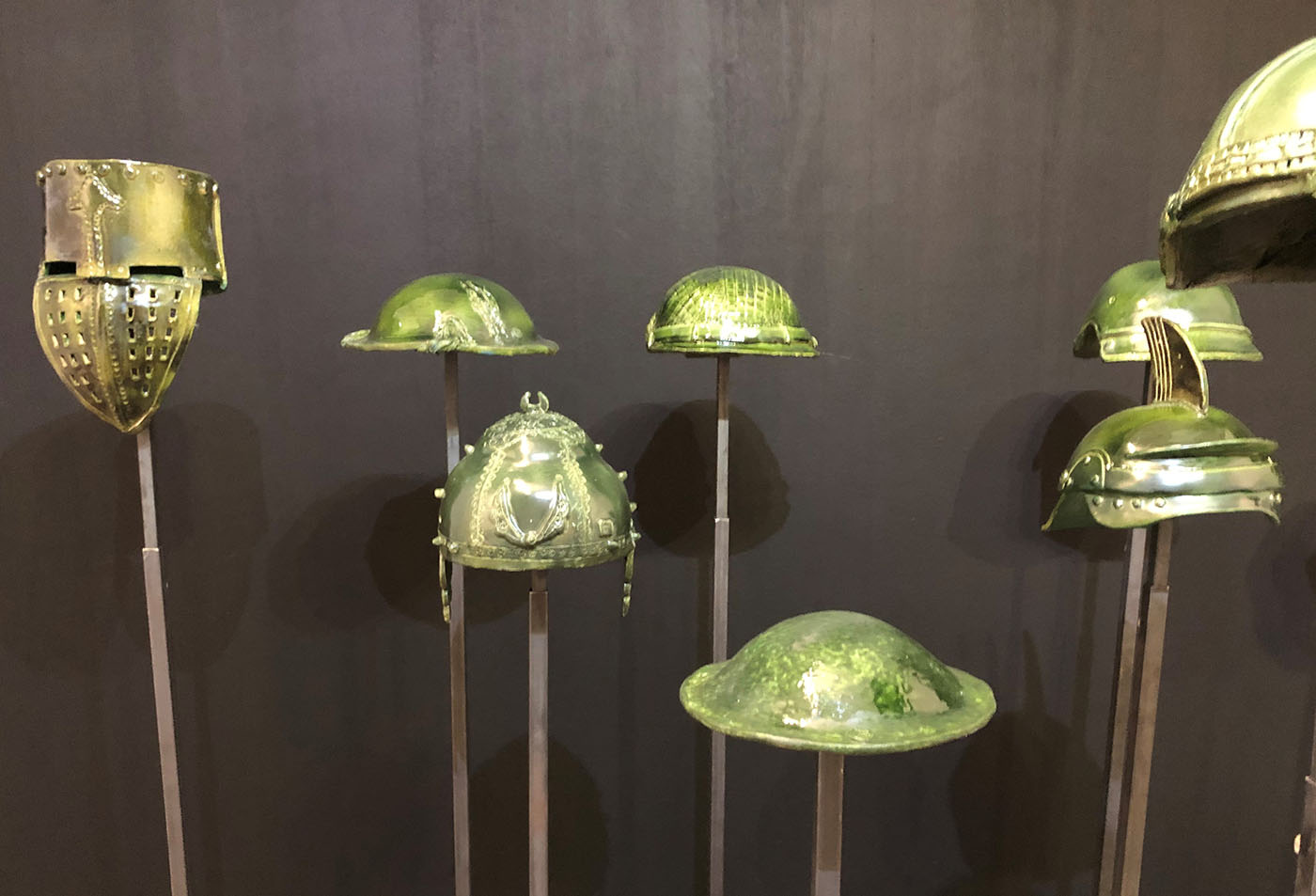
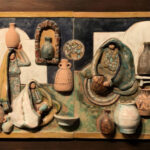
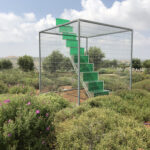
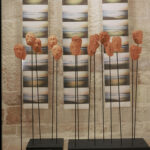
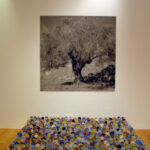
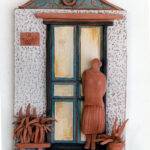
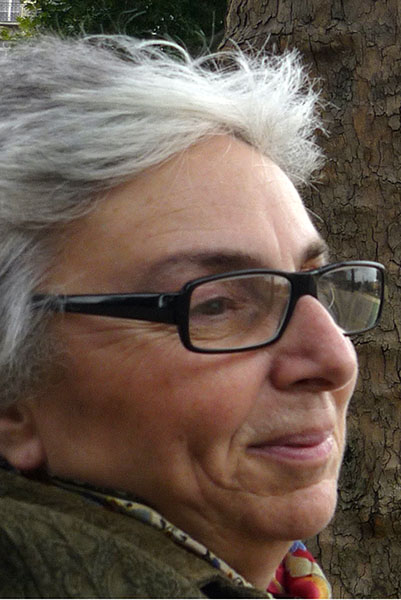



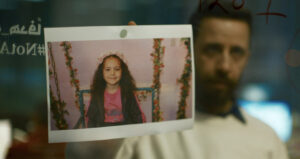





















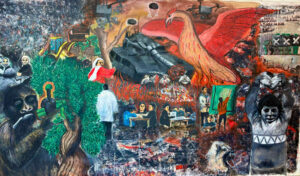
















































![Fady Joudah’s <em>[…]</em> Dares Us to Listen to Palestinian Words—and Silences](https://themarkaz.org/wp-content/uploads/2024/03/SAMAH-SHIHADI-DAIR-AL-QASSI-charcoal-on-paper-100x60-cm-2023-courtesy-Tabari-Artspace-300x180.jpg)






























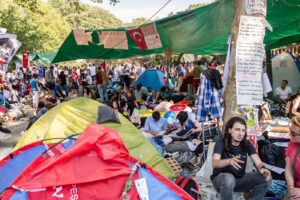


























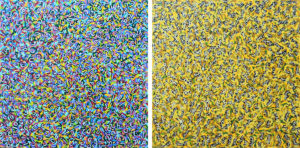





















Would you please give my regards to Vera Tamari? I met her in 1982-84 when I was at St. Antony’s College, Oxford. My name is Yo Ota.
I pray for her safety.